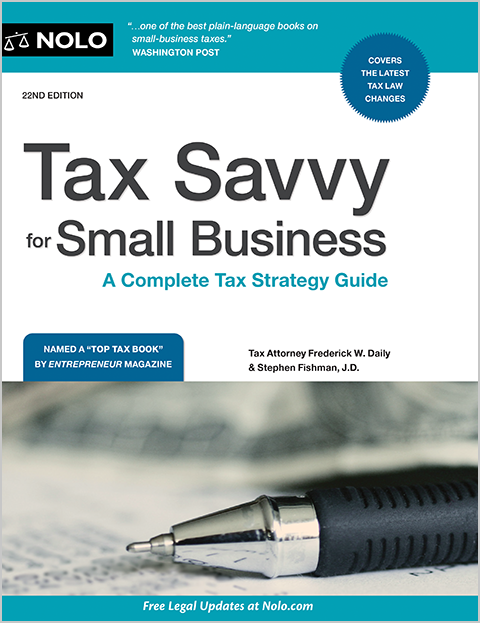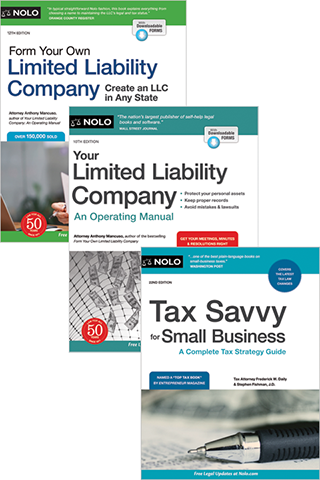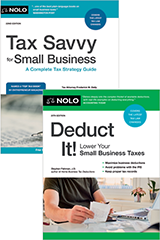Tax Savvy for Small Business
A Complete Tax Strategy Guide
- Product Details
- deduct operating expenses
- deduct travel, vehicle, and meal expenses
- take advantage of tax credits
- write off long-term assets
- compare business structures
- keep solid business records, and
- handle an IRS audit.
- IRS Publications List
- Forms Checklist and Due Dates
- Quick and Easy Access to IRS Tax Help and Tax Products (Publication 2053-A)
- About the Author
- Table of Contents
- How Tax Law Is Made and Administered: The Short Course
- Where to Find Tax Rules
- Marginal Tax Rate and Tax Brackets
- What Is—And Isn’t—Income
- A Word About Tax Shelters
- The Alternative Minimum Tax (AMT)
- What Is a Deductible Business Expense?
- Is It a Current or Future Year Expense?
- Top Deductions for Businesses
- The General Business Credit
- Vehicle Expenses
- How and Where to Claim Expense Deductions
- Tax Treatment of Business Costs
- The De Minimis Safe Harbor
- Bonus Depreciation
- Section 179: Expensing Business Assets
- Depreciating Business Assets
- How to Report Depreciation and Section 179 Deductions
- Inventory
- Tax Basis of Business Assets
- Leasing Instead of Buying
- When You Dispose of Business Assets: Depreciation Recapture
- Tax Errors in Depreciation
- Why You Need a Bookkeeping System
- Should You Hire a Bookkeeper?
- Bookkeeping Basics
- What Kinds of Records to Keep
- How Long Records Should Be Kept
- Bookkeeping Methods of Tracking Income and Expenses
- Timing Methods of Accounting: Cash and Accrual
- Accounting Periods: Calendar Year or Fiscal Year
- Unincorporated Business Losses
- Incorporated Business Losses
- Employer Identification Numbers
- What Are Payroll Taxes?
- Reporting and Depositing Payroll Taxes
- Classifying Workers: Employee or Independent Contractor?
- Misclassifying Employees as Independent Contractors
- IRS Filing and Payment Requirements for Employers
- Record Keeping for Your Workers
- What It Means to Be a Solo—From a Tax Perspective
- To Be or Not to Be—A Solo
- Solo Income and Expenses
- Solos’ Tax Forms: Schedule C Is Your Friend
- What If My Solo Biz Loses Money?
- How Solos Are Taxed
- Record Keeping for Solos
- When a Solo Closes Up Shop
- Death of a Solo
- Outgrowing the Solo
- Types of Corporations
- How C Corporations Are Taxed
- Tax Benefits of C Corporations
- Incorporating Your Business
- The Importance of Issuing Section 1244 Stock
- Taking Money Out of a C Corporation
- Tax Pitfalls of C Corporations
- Dissolving a C Corporation
- An Overview of S Corporations
- Should You Choose S Corporation Status?
- Tax Reporting for S Corporations
- How S Corporation Shareholders Are Taxed
- Social Security and Medicare Taxes
- Electing S Corporation Status
- Revoking S Corporation Status
- Dissolving an S Corporation
- Partnership Tax Status
- Tax Reporting
- Tax Obligations of Partners
- Partnership Losses
- Partnership Contributions
- Getting Money Out of a Partnership
- Partnership Expenses
- Selling or Transferring a Partnership Interest
- Ending a Partnership
- Taxes
- Comparing LLCs With Other Entities
- Operating Your LLC
- Terminating an LLC
- Qualified Personal Service Corporations
- QPSCs and Taxes
- Fringe Benefits
- Transferring Shares
- Dissolving a QPSC
- The Legal Structure of a Family Business
- Income Splitting Lowers Taxes
- Spouses Who Co-Own a Business
- Preserving a Family Business After Death
- Business Expenses Incurred at Home
- The Home Office Deduction
- Calculating Your Home Office Deduction
- Safe Harbor Rule for the Home Office Deduction
- Tax When Selling the Home Office
- A Home Business as a Tax Shelter
- How Fringe Benefits Save Taxes
- Retirement Benefits
- Motor Vehicles
- Meals
- Travel and Lodging
- Health Benefits
- Dependent Care Assistance Plan
- Long-Term Care Insurance
- Group Term Life Insurance
- Education Benefits
- Dues and Subscriptions
- Driver and Bodyguard Services
- Retirement Planning Services
- Gifts, Awards, Discounts, and Free Services
- Commuter Transportation and Parking
- Working Condition Fringes
- De Minimis Benefits
- Adoption Assistance
- Job Placement Assistance
- Cafeteria Plans
- Disaster Relief Payments to Employees
- Special Benefits for C Corporation Employees Only
- Advantages of Retirement Plans
- Overview of Retirement Plan Types
- Details About Each Type of Retirement Plan
- Where to Go for a Retirement Plan
- Potential Tax Problems With Retirement Plans
- Withdrawing Money From Retirement Plans
- Closing Your Business or Leaving Your Employer
- Buying the Assets of a Business
- Buying Shares of Stock
- Assigning a Price to Business Assets
- State and Local Transfer Taxes
- Reporting the Sale of a Sole Proprietorship
- The Importance of an Arm’s-Length Deal
- How to Protect Yourself From IRS Challenges
- Low IRS Priority—Less Than $50,000
- Getting More Time to Pay
- Paying in Installments
- What to Expect When the IRS Gets Serious
- Dealing With a Monster Tax Bill
- When the IRS Can Take Your Assets
- Who Gets Audited?
- How Long Do You Have to Worry About an Audit?
- How the IRS Audits Small Businesses
- The Auditor’s Powers
- Should You Get Audit Help?
- Preparing for Your Audit
- What to Bring to an Audit
- Don’t Rush a Field Audit
- What an Auditor Looks for When Examining a Business
- How to Behave at an Audit
- How to Negotiate With an Auditor
- Your Options After Getting an Audit Report
- When Your Audit Is Final
- IRS Appeals
- How to Get Your Audit to the Appeals Office
- Contesting an Audit in Court
- Common Reasons for Penalties
- Interest on Tax Bills
- Understanding Penalty and Interest Notices
- How to Get Penalties Reduced or Eliminated
- How to Get Interest Charges Removed
- Designating Payments on Delinquent Tax Bills
- Finding Answers to Tax Questions
- Finding and Using a Tax Pro
- IRS Publications List
- Forms Checklist and Due Dates
- IRS Services Guide (Publication 5136)
- Sample Chapter
- a portion of your rent or mortgage
- expenses for local and business trips, and
- medical expenses for yourself and your family?
- the best way to deduct business expenses and write off purchases
- the tax benefits of each business ownership structure: sole proprietorship, partnership, limited liability company, or corporation
- what kinds of records to keep and how long to keep them
- the best ways to hire help, taxwise
- top fringe benefits for small businesses
- ways to legally minimize taxes and lower your odds of an audit, and
- what to do if the IRS ever challenges your business tax reporting or sends you a tax bill you don’t agree with.
- Personal expenses can become partially deductible: your home, car, computer, meals, and education.
- Retirement plans can shelter part of your venture’s income from taxes, accumulate earnings tax deferred, and provide income for your golden years at a lower tax rate.
- Family members—young and old—can be put on the payroll to reduce a family’s overall tax bill.
- Travel and vacations can qualify in whole or in part as deductible business expenses.
Getting your tax matters on track will free up your time to do what really counts: run a profitable business. Tax Savvy for Small Business shows you how to:
This completely updated edition covers changes in tax rates, deductions, and credits, including the commercial clean vehicle tax credits under the Inflation Reduction Act of 2022. Tax Savvy for Small Business is the up-to-date resource you need to maximize your deductions and boost your business”s bottom line.
“…one of the best plain-language books on small-business taxes.”—Washington Post
“This plain-English guide will show you how to make the most of your tax deductions.”—Businessweek
Introduction
1. Tax Basics
2. Deductible Business Expenses
3. Writing Off Long-Term Business Assets
4. Bookkeeping and Accounting
5. Business Losses and Failures
6. Tax Concerns of Employers
7. Sole Proprietorships—Solos, Freelancers, and Independent Contractors
8. C Corporations
9. S Corporations
10. Partnerships
11. Limited Liability Companies
12. Qualified Personal Service Corporations
13. Family Businesses
14. Home-Based Businesses
15. Fringe Benefits
16. Retirement Plans
17. Buying a Business
18. Selling or Closing a Sole Proprietorship
19. When You Can’t Pay Your Taxes
20. Audits
21. Appealing IRS Audits
22. Penalties and Interest
23. Help Beyond the Book
24. Answers to Frequently Asked Tax Questions
Glossary
Appendix
Index
Introduction
“In America there are two tax systems; one for the informed and one for the uninformed. Both systems are legal.”
—Judge Learned Hand
Did you know that, if you have a legitimate home business, you might be able to deduct:
If mastering the tax code were a prerequisite to starting a business, no one would dare. Luckily, the basics of federal taxes are right here in this book. And once you grasp the fundamentals, you can pick up the rest as you go along, perhaps with the help of a tax adviser. As the well-worn phrase goes, “It’s not brain surgery.”
This book is for the typical small business in the United States—one that takes in less than $5 million and has fewer than 20 employees. Even if you sometimes need the help of a professional, this book will help you make informed tax decisions and put more money in your pocket at the end of the year.
You will learn:
Owning and operating a small business, full or part time, has been called the little guy’s tax shelter. The self-employed get tax benefits for expenditures not allowed to “wage slaves.” In effect, you are sharing expenses (as well as profits) with Uncle Sam—and, in most cases, with your state as well.
This book explains, in plain English, how to take advantage of the many tax benefits available to small business owners. We will show you how:
Sound interesting? With all of these possibilities, your business can earn less than if you were working for someone else, and you still can come out ahead. Of course, by going into business, you might be trading an eight-hour-a-day job for a 24-hour one. But for many of us, it is worth it.
This book has been updated to cover the tax changes enacted by Congress in 2020 and 2021 in the wake of the coronavirus (COVID-19) pandemic. Some of the tax rates, contribution and deduction amounts, and other numbers in this book change annually. Others are subject to change by Congress at any time. We provide the most current numbers available at the time this book is published. Check the IRS website for any updated rates and numbers. We will keep you posted on significant changes to the tax numbers and laws through our website (see “Get Updates to This Book on Nolo.com,” below).
We know you put your energy, resources, and money into getting your business venture started or keeping it running. Let us help by giving you the practical information you need to make the best tax choices and decisions.
We hope you enjoyed this sample. The complete book is available for sale here at Nolo.com.
Customers Who Bought This Item Also Bought
Nolo's Start & Run an LLC Bundle
A Complete Tax Strategy Guide



